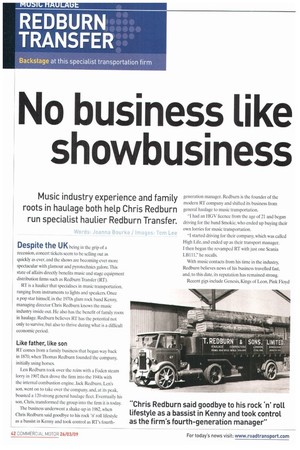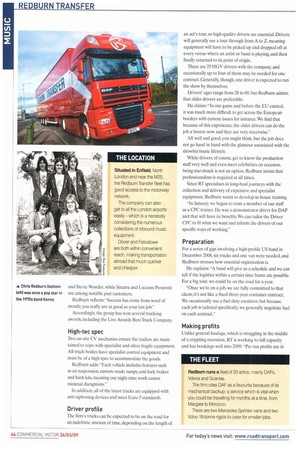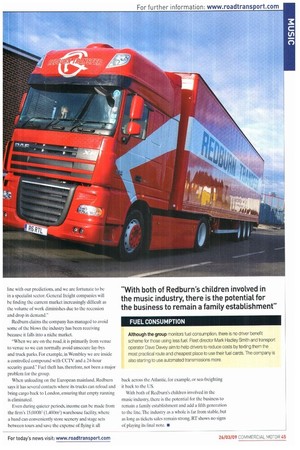No business like showbusiness
Page 42

Page 44

Page 45

If you've noticed an error in this article please click here to report it so we can fix it.
Music industry experience and family roots in haulage both help Chris Redburn run specialist haulier Redburn Transfer.
Words: Joanna Bourke images: Tom Lee Despite the UK being in the grip of a recession, concert tickets seem to be selling out as quickly as ever, and the shows are becoming ever more spectacular with glamour and pyrotechnics galore. This state of affairs directly benefits music and stage equipment distribution firms such as Redburn Transfer (RT).
RT is a haulier that specialises in music transportation. ranging from instruments to lights and speakers. Once a pop star himself, in the 1970s glam rock band Kenny, managing director Chris Redburn knows the music industry inside out. He also has the benefit of family roots in haulage. Redburn believes RT has the potential not only to survive, but also to thrive during what is a difficult economic period.
Like father, Like son
R I comes Irom a lamily business that began way back in 1870, when Thomas Redburn founded the company, initially using horses.
Len Redburn took over the reins with a Foden steam lorry in 1907, then drove the firm into the 1940s with the internal combustion engine. Jack Redburn, Len's son, went on to take over the company, and, at its peak, boasted a 120-strong general haulage fleet Eventually his son, Chris, transformed the group into the firm it is today.
The business underwent a shake-up in 1982, when Chris Redburn said goodbye to his rock 'n' roll lifestyle as a bassist in Kenny and took control as RT's fourth generation manager. Redburn is the founder of the modern RT company and shifted its business from general haulage to music transportation.
"I had an HGV licence from the age of 21 and began driving for the band Smokie, who ended up buying their own lorries for music transportation.
-I started driving for their company, which was called High Life, and ended up as their transport manager.
then began the revamped RT with just one Scania LB111," he recalls.
With music contacts from his time in the industry, Redburn believes news of his business travelled fast, and, to this date. its reputation has remained strong.
Recent gigs include Genesis, Kings of Leon, Pink Floyd and Stevie Wonder, while Sinatra and Luciano Pavarotti are among notable past customers.
Redbum reflects: "Success has come from word of mouth; you really are as good as your last job."
Accordingly, the group has won several trucking awards, including the Live Awards Best Truck Company.
High-tec spec
Two on-site CV mechanics ensure the trailers arc maintained to cope with specialist and often fragile equipment. All truck bodies have specialist control equipment and must be of a high spec to accommodate the goods.
Redburn adds: "Each vehicle includes features such as air suspension, custom-made ramps, anti-lock brakes and hush kits, meaning our night-time work causes minimal disruptions."
In addition, all of the latest trucks are equipped with anti-siphoning devices and meet Euro-5 standards.
Driver profile
The firm's trucks can be expected to be on the road for an indefinite amount of time, depending on the length of an act's tour, so high-quality drivers are essential. Drivers will generally see a tour through from A to Z, meaning equipment will have to be picked up and dropped off at every venue where an artist or band is playing, and then finally returned to its point of origin.
There are 25 HGV drivers with the company, and occasionally up to four of them may be needed for one contract. Generally, though, one driver is expected to run the show by themselves.
Drivers' ages range from 28 to 60, but Redburn admits that older drivers are preferable.
He claims: "In our game and before the EU existed, it was much more difficult to get across the European borders with custom issues for instance. We find that because of this experience, the older drivers can do the job a breeze now and they are very streetwise."
All well and good, you might think, but the job does not go hand in hand with the glamour associated with the showbiz/music lifestyle.
While drivers, of course, get to know the production staff very well and even meet celebrities on occasion, being star-struck is not an option. Redburn insists that professionalism is required at all times.
Since RT specialises in long-haul journeys with the collection and delivery of expensive and specialist equipment. Redburn wants to develop in-house training.
"In Januarc we began to train a member of our staff as a CPC trainer. He was a demonstrator driver for DAF and that will have its benefits. We can tailor the Driver CPC to fit what we want and inform the drivers of our specific ways of working."
Preparation
For a series of gigs involving a high-profile US band in December 2008, six trucks and one van were needed, and Redburn stresses how essential organisation is.
He explains: "A band will give us a schedule and we can tell if the logistics within a certain time frame are possible. For a big tour, we could be on the road for a year.
"Once we're on a job, we are fully committed to that client; it's not like a fixed three-year container contract. We occasionally use a fuel duty escalator, but because each job is tailored specifically, we generally negotiate fuel on each contract." line with our predictions, and we are fortunate to be in a specialist sector. General freight companies will be finding the current market increasingly difficult as the volume of work diminishes due to the recession and drop in demand."
Redburn claims the company has managed to avoid some of the blows the industry has been receiving because it falls into a niche market.
"When we are on the road, it is primarily from venue to venue so we can normally avoid unsecure lay-bys and truck parks. For example, in Wembley we are inside a controlled compound with CCTV and a 24-hour security guard." Fuel theft has. therefore, not been a major problem for the group.
When unloading on the European mainland, Redbum says it has several contacts where its trucks can reload and bring cargo back to London, ensuring that empty running is eliminated.
Even during quieter periods, income can be made from the firm's 15,000ft2 (1,400m2) warehouse facility, where a band can conveniently store scenery and stage sets between tours and save the expense of flying it all
back across the Atlantic, for example, or sea-freighting it back to the US.
With both of Redburn's children involved in the music industry, there is the potential for the business to remain a family establishment and add a fifth generation to the line. The industry as a whole is far from stable, but as long as tickets sales remain strong, RT shows no signs of playing its final note. •












































































































































